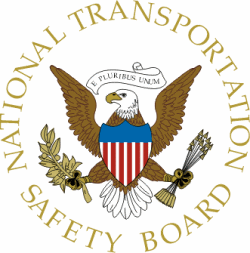Notes ATC Shortcomings, Issues Recommendations On ATC
Procedures
 The NTSB has determined that Northwest Airlines flight 188
overflew its destination airport of Minneapolis by more than 100
miles and failed to maintain radio communications because the
pilots became distracted by a conversation unrelated to the
operation of the aircraft. The NTSB's accident brief, released
Thursday, also notes air traffic control shortcomings during the
event, and the Board issued two safety recommendations to address
those shortcomings.
The NTSB has determined that Northwest Airlines flight 188
overflew its destination airport of Minneapolis by more than 100
miles and failed to maintain radio communications because the
pilots became distracted by a conversation unrelated to the
operation of the aircraft. The NTSB's accident brief, released
Thursday, also notes air traffic control shortcomings during the
event, and the Board issued two safety recommendations to address
those shortcomings.
On October 21, 2009, Northwest Airlines flight 188, an Airbus
A320 (N374NW) operating as a scheduled flight between San Diego and
Minneapolis, did not communicate with air traffic control for
approximately one hour 17 minutes. While in this NORDO (no radio
communications) state, it flew
past its intended destination at a cruise altitude of 37,000 feet.
The crew subsequently re-established radio communications and
landed without further incident. There were no injuries.
The NTSB said that the pilots continued to fly through several
air traffic control sectors without replying to any radio commands.
The investigation found that the pilots had become engaged in a
conversation dealing with the process by which pilots request
flight schedules and during the conversation each was using his
personal laptop computer, contrary to company policy. The pilots
were not aware of the repeated attempts by air traffic controllers'
and the airline to contact them until a flight attendant used the
intercom to inquire about the progress of the flight.
The NTSB also found that the lack of national requirements for
recording ATC instructions when using automated flight tracking
systems, such as directing an aircraft to switch frequencies or to
indicate that an aircraft has checked in on an assigned frequency,
was a factor in the controllers delay in performing necessary
actions and notifications required by lost communications
procedures. In addition, because NORDO events of a short duration
are not uncommon, the Safety Board found that controllers and
managers may have become complacent in completing necessary NORDO
actions and required notifications in a timely manner.
As a result of deficiencies in ATC communications procedures
revealed in this investigation and an accident involving a Pilatus
PC-12/45 that crashed in Butte, Montana on March 22, 2009, the
Board is making recommendations to the FAA to address the following
issues:
- The lack of standard procedures for identifying flight crew-ATC
communications in ATC facilities that use automated flight tracking
systems.
- The lack of standard phraseology for identifying the emergency
nature of emergency ATC radio transmissions.
The NTSB recommends that the FAA:
- Establish and implement standard procedures to document and
share control information, such as frequency changes, contact with
pilots, and the confirmation of the receipt of weather information,
at air traffic control facilities that do not currently have such a
procedure. These procedures should provide visual communication of
at least the control information that would be communicated by the
marking and posting of paper flight-progress strips described in
Federal Aviation Administration Order 7110.65, “Air Traffic
Control.”
- Require air traffic controllers to use standard phraseology,
such as “on guard,” to verbally identify transmissions
over emergency frequencies as emergencies.
The NTSB will convene a 3-day public forum on professionalism in
aviation to address methods for ensuring excellence in pilot and
air traffic controller performance. The forum is intended to raise
awareness by promoting an open discussion between the Board and
invited panelists drawn from industry, labor, academia, and
government on the importance of developing and reinforcing
professionalism in the aviation industry. The forum is scheduled
for May 18-20, 2010. More information regarding the forum will be
announced in the coming weeks.
 ANN's Daily Aero-Term (05.01.24): Say Altitude
ANN's Daily Aero-Term (05.01.24): Say Altitude ANN's Daily Aero-Linx (05.01.24)
ANN's Daily Aero-Linx (05.01.24) Classic Aero-TV: Korean War Hero Twice Reborn
Classic Aero-TV: Korean War Hero Twice Reborn Airborne 04.29.24: EAA B-25 Rides, Textron 2024, G700 Deliveries
Airborne 04.29.24: EAA B-25 Rides, Textron 2024, G700 Deliveries Airborne Affordable Flyers 05.02.24: Bobby Bailey, SPRG Report Cards, Skydive!
Airborne Affordable Flyers 05.02.24: Bobby Bailey, SPRG Report Cards, Skydive!



